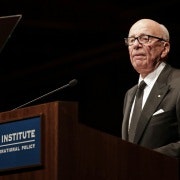The Chinese elephant in Australia's trade office
In a week in which our Prime Minister has been spruiking the resources sector and the promise of great returns for investment in Australian infrastructure, Chinese President Xi Jinping was urging his country to sharpen its focus on science and technology, and to drive indigenous innovation.
This week President Xi delivered a comprehensive speech detailing China’s priority focus on “core technologies” as a fundamental prerequisite for the nation’s future prosperity and security.
Speaking in front of 1300 researchers at a meeting of the Chinese Academy of Sciences and Chinese Academy of Engineering, he urged "innovation, innovation and innovation," while outlining new policies for fostering creativity and removing barriers to technological development.
China is seeking to both attract and foster world-class talent and aims to nurture “the huge potentials of science and technology as the primary force of productivity”. This includes boosting spending on research and driving new policies to improve innovation in the tertiary education sector.
Xi also outlined his desire for China to have a greater say in the rules and frameworks that drive technology standards -- so the world can expect greater participation by Chinese interests in global technology forums and standards bodies.
The President’s speech was couched against a somewhat nationalistic back-story that could be uncomfortable to Western ears, but which is fairly typical of Chinese leadership when rallying an issue of national priority. That is, the speech heavily referenced an era in the 19th and 20th centuries during which China had been dominated -- to its humiliation -- by the West, and by Japan.
This might be uncomfortable to Westerners, but really it only serves to underline the seriousness of China’s message and its sentiments about innovation in setting national policy direction. And it is not so different to the broader innovation messaging in the West.
“Science and technology are the foundation of national strength and prosperity, and innovation is the soul of national advancement,” President Xi said. “In a certain sense, scientific and technological strength determines changes in the world balance of political and economic power, and determines the fate of every nation.”
It’s not exactly comparing apples with apples when looking at China’s innovation policies against Australia’s. It does, however, highlight the starkly different national priorities in relation to technology.
But I would make the point that until Australia has a prime minister who is comfortable and genuine about talking about science and technology as a national economic and security priority, the tech sector will struggle in this country.
Culture flows from the top. I am not talking about start-ups here, although they are one part of a much bigger set of stakeholders in this. The disdain with which core science is held in this country, together with the broader technological disciplines of maths and engineering, will not change without highly visible, top-down campaigns and policies of encouragement to back them up. And it is going to take many years.
I have long argued that Australia should be more proactive in establishing stronger tech sector ties with China. There are enormous opportunities for the Australian sector in forging stronger links, and big benefits for the broader political and economic relationship.
A more diversified trade relationship is a good thing, taking some of the sting out of political friction points (for both China and Australia) and involving the resources and agribusiness sectors and even the property market.
And there is low-hanging fruit in the tech sector that could very quickly benefit the relationship from both sides with some targeted policies. This might mean targeting the many thousands of STEM students from China who study in Australia to make it easier for potential founders to set up companies here, or to work for Aussie start-ups. Or it may involve providing more incentives to Significant Investor Visa applications to invest in higher-risk tech, rather than managed funds and property.
There is a well-worn path to Silicon Valley from Australia. But it is not the only path and there is no reason why the US tech industry should be our only partner.
I have been highly critical in the past about the group StartupAus and its somewhat blinkered vision for the Australian tech sector. It is annoyingly remiss that its Crossroads report doesn’t even rate China (or indeed Asia) a mention as a source of capital, a source of technology and a source of potential business partners -- let alone as a very large and fast-growing consumer market.
StartupAus is a Google offspring and it is reasonable to assume that any report it produces is not going represent Australia’s interests in pursuing tech business in China.
Australia has opportunities to engage with China’s tech sector precisely because we are not the United States. It is one of our competitive advantages -- and we should be pursuing it. This does not diminish our relationship with the US, or the vigour with which we should pursue opportunities in the US.
But for the Australian tech sector to simply ignore the potential of growing our relationships in China is crazy.
Of course, the Australian government is very focused on China and on developing our trade relationship further. But because our government’s technology policy is so dramatically under-prioritised, the tech sector barely registers in relation to China trade policy.
Trade Minister Andrew Robb last month appointed his Trade and Investment Policy Advisory Council. It makes for grim reading for the tech sector, because there is no representation on it for our industry.
And this is a great shame.
James Riley has covered technology and innovation issues in Australia and Asia as a writer and commentator for 25 years.
He has a special interest in public policy as it affects the tech sector and has written for newspapers and trade magazines, including The Australian, the South China Morning Post, InformationWeek and PC Week.
















